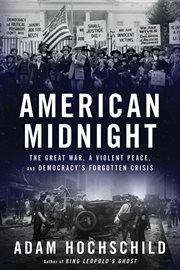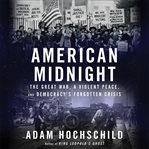Review by Booklist Review
As the U.S. mobilized to enter WWI, President Woodrow Wilson appealed to both reason and emotion as he motivated Americans to throw their complete energies into a conflict certain to cost the nation both money and blood. In whipping up citizens, Wilson also demonized enemies, creating a frenzy in which people turned against their neighbors and took anti-German sentiments as far as finding coded messages within Bach's St. Matthew Passion. To meet demands for armaments and keep a docile work force, industrialists turned public opinion against unions striving to prevent worker exploitation. As is so often the case in America, Black citizens endured special mistreatment, one white Army officer expressing an opinion that African Americans should be sent to the front lines for what amounted to extermination. Black veterans were lynched in their uniforms. Conscientious objectors suffered particular disdain and ended up in prisons where sadistic guards tortured them with impunity. After the Armistice, socialists Eugene V. Debs and Emma Goldman faced further attack for their protests against the exploitation of laboring men and women. Expanding his history begun in To End All Wars (2011), Hochschild brings to light people and themes that are too often mere footnotes in other records of the Great War.
From Booklist, Copyright (c) American Library Association. Used with permission.
Review by Publisher's Weekly Review
President Woodrow Wilson's call for the U.S. to enter WWI to make the world "safe for democracy" ironically set the stage for an unprecedented attack on Americans' civil liberties, according to this expert and eye-opening account. Historian Hochschild (Rebel Cinderella) notes that increasing numbers of immigrants from Italy, Eastern Europe, and Russia during the early 20th century provoked nativist resentments and violent attacks from Americans whose Protestant ancestors came from England and northwestern Europe. Even more common, however, was violence against coal miners, steel workers, and other laborers attempting to unionize. Hochschild documents how new laws ostensibly passed to protect America's national security, including the Espionage and Sedition Acts, were weaponized against the foreign born, labor activists, and pacifists. Though few records remain, Hochschild cites claims by one lawyer that between 1917 and 1921, 462 men and women were jailed by the federal government for a year or longer for their written or spoken words. He also documents outbreaks of racial violence, anarchist bombings, and the 1919 Palmer raids, which targeted the Union of Russian Workers. Meticulously researched, fluidly written, and frequently enraging, this is a timely reminder of the "vigilant respect for civil rights and Constitutional safeguards" needed to protect democracy and forestall authoritarianism. (Oct.)
(c) Copyright PWxyz, LLC. All rights reserved
Review by Library Journal Review
The chaotic period between 1917 and 1921 is an underrepresented era of American history. Students learn about World War I, but not much is studied about the violent harassment and jailing of conscientious objectors, socialists, members of the International Workers of the World (Wobblies), and the frequent, unpunished lynchings of Black people during this period. Hochschild (To End All Wars) recounts the horrors inflicted on individual citizens for attempting to speak their conscience about the U.S. involvement in the war. The American Protection League (APL), a private organization, had the approval to operate by the U.S. Department of Justice and President Wilson. Many chilling acts of violence and harassment conducted by the APL and similar groups under the guise of patriotism are depicted. Also illustrated in concise and alarming effect is how the Sedition Act and the Espionage Act were used to jail citizens as well. For example, the U.S. Postal Service used it to suppress mail that it felt was disloyal to the U.S. government or army, stopping the mailing of socialist newspapers and more. VERDICT During the United States' current tumultuous times, it is important to remember and revisit the forgotten injustices of the previous century. Hochschild succinctly does so here.--Julie Feighery
(c) Copyright Library Journals LLC, a wholly owned subsidiary of Media Source, Inc. No redistribution permitted.
Review by Kirkus Book Review
A history of the early-20th-century assault on civil rights and those the federal government deemed un-American. For Hochschild--the winner of the Los Angeles Times Book Prize and Dayton Literary Peace Prize, among many other honors--one of America's darkest periods was between 1917 and 1921. "Never was [the] raw underside of our national life more revealingly on display." Those years, he writes, were rife with "the toxic currents of racism, nativism, Red-baiting, and contempt for the rule of law [that] have long flowed through American life"--and clearly still do today. From the country's entry into World War I until Warren Harding became president, the federal government and law enforcement agencies joined with the civilian-staffed American Protective League and union-busting industrialists to censor newspapers and magazines; fabricate communist conspiracies; surveil and imprison conscientious objectors and labor leaders (particularly the Wobblies); harass socialists, German immigrants, pacifists, and Jews; deport foreigners without due process; and stand aside as police and vigilantes killed labor activists and destroyed Black communities and formed lynch mobs. Among numerous others, those who benefitted most politically were J. Edgar Hoover and Attorney General A. Mitchell Palmer. Woodrow Wilson presided over the entire toxic political and social landscape. Ultimately, writes the author, "a war supposedly fought to make the world safe for democracy became the excuse for a war against democracy at home." Labor leaders, socialists, and anti-war activists such as Eugene Debs and Emma Goldman, along with government officials such as Sen. Robert La Follette and Secretary of Labor Louis Post, resisted but with little success. Although these threats to civil liberties were subsequently deflected, "almost all of the tensions that roiled the country during and after the First World War still linger today." The book is exceptionally well written, impeccably organized, and filled with colorful, fully developed historical characters. A riveting, resonant account of the fragility of freedom in one of many shameful periods in U.S. history. Copyright (c) Kirkus Reviews, used with permission.
Copyright (c) Kirkus Reviews, used with permission.


